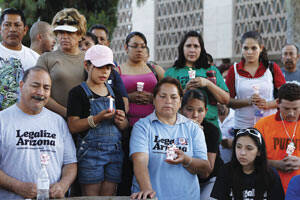Arizona’s SB 1070, a controversial law aimed at enforcing a statewide immigration policy, receives most of the U.S. media attention and has provoked a lawsuit from the federal Department of Justice, but some U.S. municipalities have likewise tried to localize U.S. immigration law. When residents of Fremont, Neb., voted on June 21 to bar undocumented immigrants from renting housing or getting jobs in their city, they stepped onto a path that other U.S. towns have already blazed, with legal and political results that remain uncertain years later. One unexpected outcome, however, has become painfully clear: the fiscal and civic cost of such ordinances.
Suits challenging the Fremont law are already being prepared and the city has opened a legal defense fund to cover expected costs, estimated at anywhere from $270,000 to more than $5 million. In the past four years, Hazleton, Pa.; Farmer’s Branch, Texas; Valley Park, Mo.; Escondido, Calif.; and Riverside Township, N.J., all have attempted to pass laws similar to Fremont’s. Various courts have overturned or blocked most of those laws, but that has not precluded consequences in the communities.
Msgr. Joseph Kelly, director of Catholic Social Services in the Diocese of Scranton, Pa., which includes Hazleton, is the episcopal vicar for Hispanic ministry for the diocese and administrator of Holy Rosary Church in Wilkes Barre, about 20 miles up the road from Hazleton. When Hazleton’s city council passed its immigration ordinance in 2006, many immigrants who lived there left the immediate area. Many of them ended up in Monsignor Kelly’s parish. Hazleton’s mayor, Lou Barletta, estimated that as many as half the city’s 10,000 Hispanics moved away. But according to Monsignor Kelly, four years later they have been replaced by new immigrants from the Dominican Republic.
In many respects, Hazleton is similar to Fremont, noted Monsignor Kelly, who used to work in Nebraska at Boys Town, not far from Fremont. Both are somewhat isolated small towns with low-skill industries that in the past couple of decades have attracted Hispanic immigrants who bolstered the previously shrinking populations. But the new residents who were hired at direct-mail operations in Pennsyl-vania and meat-packing plants in Nebraska, who opened businesses and enrolled their children in schools, also came speaking Spanish and have a culture that was unfamiliar in their new communities. Change was uncomfortable for many of the longtime residents.
Mary Ellen Blackwell, director of parish social ministry for Catholic Charities of the Diocese of Trenton, N.J., said that when Riverside Township passed an immigration law in 2006, hostility toward the largely Brazilian immigrants was open and vocal. She described a prayer vigil in August 2006, shortly after the law passed, at which the law’s backers tried to drown out the prayers with shouts of “Go home” and hovered around the outdoor event, waving Confederate flags and taunting participants as they walked from the town hall to the Catholic Church.
“It was like Jesus walking to Calvary,” she said. “There was this amazing sense of how the crowd mentality works.”
Monsignor Kelly offered advice to the church in Fremont: “They need to be sure they are ministering to all the community, including the immigrants.” Inviting people to share in one anothers’ cultural celebrations, he said, is a start; “the church needs to try to bring people together.”








